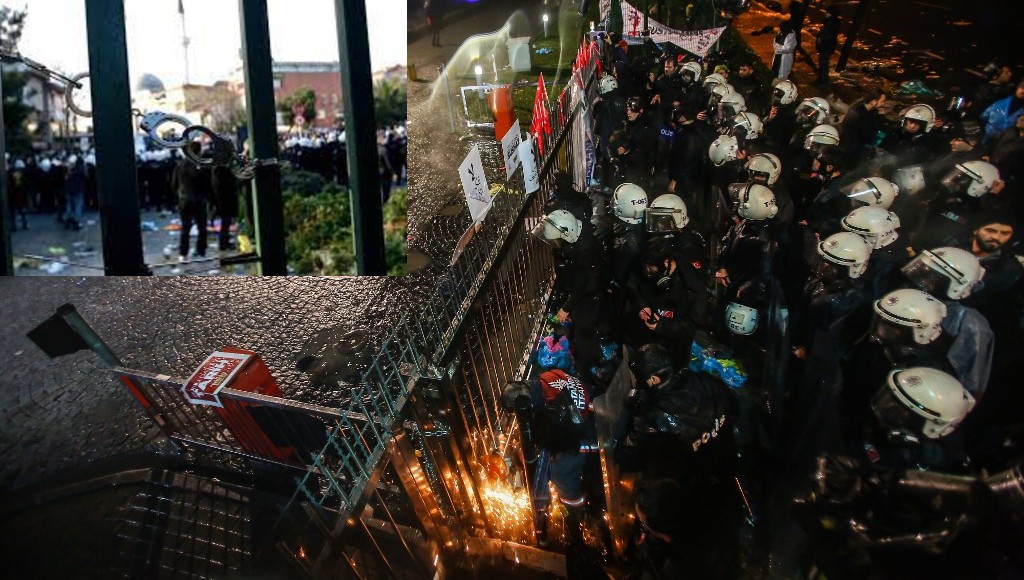Opinion by Fatma Zeybek
When I saw the heavy police presence at İstanbul’s prestigious Boğaziçi University, where I had the opportunity to earn my bachelor’s degree 15 years ago, with snipers positioned on rooftops and students dragged unceremoniously away by the police, sad memories were rekindled in my mind of the brutal takeover of my workplace by the Turkish government in March 2016.
The Zaman newspaper, where I was hired immediately after graduation and enjoyed working for more than 10 years, witnessed the same course of tragic events that are now taking place at Boğaziçi, where the students have been courageously fighting for weeks to protect the university’s autonomy and their freedoms against the arbitrary appointment of a pro-government rector with a poor academic record.
On the tragic night of March 4, 2016 dozens of police marched onto the Zaman premises in İstanbul to seize the daily’s headquarters, to formally place it under government control, pushing aside anyone who stood in their way. The bolt cutters used to open the the building’s steel gate that night were used for the same purpose at Boğaziçi University, with handcuffs attached to the gates to block protesting students from entering the campus. The bolt cutters and handcuffs were symbols of political repression and the tools of an authoritarian government used to silence dissenting views and opposition. In one case it was media freedom that was stolen, with academic freedom at stake in the other.
When Zaman and other dissenting media outlets were closed down one after the other and dozens of colleagues were sent to jail just because of their views critical of President Recep Tayyip Erdoğan and the authoritarian policies of his Justice and Development Party (AKP) government, it was crystal clear at the time that the effects of an alarming trend of authoritarianism in the country would not remain limited to the media but would infiltrate every segment of society and ultimately reach academia.
Yet, Erdoğan, who complains about his party’s failure to establish its hegemony over the realms of education and culture, faced unusual defiance at Boğaziçi, one of the few remaining bastions of democratic thought with a critical stance against the democratic backsliding in Turkey at the hands of the AKP government.
In addition to an international reputation for quality education, Boğaziçi University has a unique liberal atmosphere that provides its students with opportunity in a spirit of free inquiry and expression. The moment I stepped onto this university campus as a headscarved young woman years ago, it did not take me long to feel that atmosphere when secular-looking students kindly offered me help with completing my registration at a time when I, as the daughter of a middle-income family from a small Anatolian town, was overwhelmed by fears of rejection due to my Islamic attire. My fears were quickly replaced by feelings of relief and belonging in the inclusive atmosphere of this university as I got acquainted with its students and academic staff.
Those were the days in 2001 when people with conservative backgrounds, especially headscarved women, were subjected to heavy pressure and discrimination as Turkey was recovering from the repercussions of a military intervention on Feb. 28, 1997 that forced a coalition government led by a now-defunct Islamic party to resign on the grounds that there was rising religious fundamentalism in the country. Conservatives were under tight state scrutiny.
However, a headscarf ban that was strictly enforced in public places and at other universities at the time was in effect at Boğaziçi in only a mild form, with many academic staff refusing to interfere in the students’ attire and with de facto headscarf freedom implemented in my final years there.
The existence of differing political beliefs and worldviews among students did not lead to the violent conflicts and clashes seen at other Turkish universities at the time, but it was possible to see students engaging in fierce political discussions in class or while sitting on the grass of the south campus or on benches overlooking the Bosporus. Everyone enjoyed the existence of free speech on the campus, and nobody had any problems or complaints about it.
When our entire class wanted to leave a lecture early to take part in a demonstration on the south campus in protest of the Iraq War in 2003, our professor accompanied us, too, and I remember seeing a diverse group of students and staff members chanting anti-war slogans together that day, just like the students and lecturers marching hand-in-hand today to protect Boğaziçi’s legacy of freedoms and democratic culture.
Today I feel unbearable sadness when I see my beautiful university subjected to acts of government repression and brutality, just like I felt when my workplace was unlawfully seized by the government. But at the same time I feel pride and gratification about the resistance and determination of the students not to hand over a rare safe haven for personal liberties to an authoritarian regime that would perhaps not manage to eliminate the traditional democratic atmosphere of the university but would in some way undermine it.

